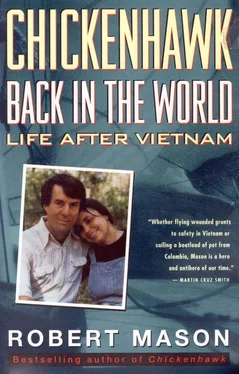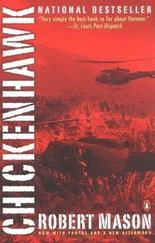Robert Mason - Chickenhawk - Back in the World - Life After Vietnam
Здесь есть возможность читать онлайн «Robert Mason - Chickenhawk - Back in the World - Life After Vietnam» весь текст электронной книги совершенно бесплатно (целиком полную версию без сокращений). В некоторых случаях можно слушать аудио, скачать через торрент в формате fb2 и присутствует краткое содержание. Год выпуска: 2013, Издательство: BookBaby, Жанр: Старинная литература, на английском языке. Описание произведения, (предисловие) а так же отзывы посетителей доступны на портале библиотеки ЛибКат.
- Название:Chickenhawk: Back in the World - Life After Vietnam
- Автор:
- Издательство:BookBaby
- Жанр:
- Год:2013
- ISBN:нет данных
- Рейтинг книги:3 / 5. Голосов: 1
-
Избранное:Добавить в избранное
- Отзывы:
-
Ваша оценка:
- 60
- 1
- 2
- 3
- 4
- 5
Chickenhawk: Back in the World - Life After Vietnam: краткое содержание, описание и аннотация
Предлагаем к чтению аннотацию, описание, краткое содержание или предисловие (зависит от того, что написал сам автор книги «Chickenhawk: Back in the World - Life After Vietnam»). Если вы не нашли необходимую информацию о книге — напишите в комментариях, мы постараемся отыскать её.
Chickenhawk: Back in the World - Life After Vietnam — читать онлайн бесплатно полную книгу (весь текст) целиком
Ниже представлен текст книги, разбитый по страницам. Система сохранения места последней прочитанной страницы, позволяет с удобством читать онлайн бесплатно книгу «Chickenhawk: Back in the World - Life After Vietnam», без необходимости каждый раз заново искать на чём Вы остановились. Поставьте закладку, и сможете в любой момент перейти на страницу, на которой закончили чтение.
Интервал:
Закладка:
We heard thunder and saw lightning to the east. In a half hour, the storm hit. The Namaste leaned into the wind and plunged against the building sea. John was right. Going against the sea was much tougher. Waves as big as the ones we’d cut through smoothly coming down now bashed the bow and washed the decks.
I went below and crawled up on top of the pile of pot and lay down. I slept on a pungent, lumpy, million-dollar bed.
The next morning the storm was gone, but the wind was still strong. Daylight showed what a mess we had below decks. The helter-skelter bales had to be repacked just to give us a couple of level places to lie down. The stale marijuana smell, which had been overpowering the night before, was now barely noticeable as we got used to it. I smelled something else, a faint odor of fuel. Maybe gasoline? I made some coffee and went on deck. A light rain drummed the dodger. I saw a bird sitting on the safety line. Looked like a heron, a freshwater bird. What was he doing a hundred miles away from land?
“Probably got blown out during the storm last night,” John said. “I’ve seen it before.”
I leaned out of the dodger and the bird flew fifty yards away, paralleling us.
“The poor bastard can’t fly back home,” John said. “And he can’t land in the water like a gull—soak up and sink like a feather duster. He’s fucked.”
We watched the bird flying for half an hour. He was getting tired, flying lower and lower. Finally he flew back to the boat and landed on the starboard safety line, jerked back and forth to get his balance, cocked his head, and eyed us suspiciously.
Ireland came up, singing, “I’m Popeye the sailor man—” John and I shushed him. “Quiet, Ramon,” John said. He nodded to our mascot, hunched over on the safety line, dripping wet in the rain. “Dumb bird will fly out and drown.”
“Dammy,” Ireland said, looking at the bird with concern on his face. “Maybe we should catch it and let it go when we get near the Virgins.”
John nodded skeptically. “Help yourself.”
Ireland spent a half hour stalking the heron while the bird watched every move he made. When Ireland got too close, it launched itself back over the sea and fluttered weakly nearby.
The sky cleared and we beat north through rough seas, the wind whistling through the Namaste’s rigging. The heron spent the day flying out, almost out of sight, looking for home, and returning, more exhausted each time, to his perch on the safety line. He’d rest for an hour and repeat the search for his flock. It was depressing. I made an entry in my notebook about, if the bird could think, how easy it would be for him to just decide to sit on the deck and wait until we got close to land and fly ashore. But then, he’d never see home again that way, either.
The next morning the heron was gone. Now and then we saw birds flying around, but they were gulls. The heron was fish food. At sunset we saw another storm approaching. A nasty one. We had to reef the sails. Spent the night wondering if the Namaste was coming apart. Had to go out and tighten a loose turnbuckle on the port shroud. The cable had stretched.
I woke up with a headache. The Namaste was being tossed extra hard; how could the storm get any worse? I felt nauseous. The gasoline smell, or something petroleum, volatile, was really strong. We figured it was spilled fuel from trying to top off the fuel tank from glass jugs on a rocking boat. But diesel fuel smells like kerosene. I’d had lots of experience with solvents in the silk-screen process when I made mirrors, and the smell was familiar. I hate solvents. I went above with John and Ireland under the dodger.
“We’ve got to find where those fumes are coming from, John. It’s getting real bad,” I said. “That stuff will eat your brains out.”
“I know,” John said. “I’ve smelled this stuff before, but I can’t place it. We’ll find it.”
We went below. Just the minute or so I’d spent on deck was enough fresh air to flush out my lungs. The chemical stench below was overpowering, sickening. We couldn’t open the overhead cabin vent because waves were bashing over the decks. Ireland and I crawled all over the load sniffing like bloodhounds. The odor was equally strong wherever we looked. Somewhere, under thirty-five hundred pounds of marijuana, was the source of the gas that was poisoning us.
We spent a couple of hours moving bales from the left side of the cabin, stuffing them forward and to the right, to get to the locker under the bunk on the port side. It was slow and heavy work in a stifling, cramped, rolling space. We’d shove a bale up to the top of the pile and it’d roll back when the Namaste lurched. Eventually we uncovered the locker. Ireland and I pried up the cover. Seawater sloshed over some spare ropes and tools, but we didn’t see anything that could be the source of the gas. Disgusted, we took a break under the dodger.
“That stuff makes me see spots,” Ireland said. He lit a cigarette and sucked deeply. “Ah. That’s better!”
An hour later, we wrestled all the bales back to the port side and burrowed our way down to the starboard locker. We could get to the latch, but there were still too many bales wedging it shut. Took another hour to shift the load clear. We pried up the locker cover. This was the low side of the boat, and the water was deep in the locker. Apparently the silicon caulking had missed the real leaks. We saw the problem: paint cans. The seawater had eaten through the three steel gallon cans of paint and a gallon of paint thinner that everybody’d forgotten about. The paint and solvent were sloshing around in the water, raising an invisible cloud of noxious gas.
Overcome by the fresh blast of fumes, we ran out under the dodger to get fresh air. It was maddening. If we weren’t in this storm, we’d be able to open some hatches and vent some of the gas away, but the storm was worse than ever. Waves crashed onto the dodger. We were taking water through the overhead cabin vent, and it was screwed down tight. We tried to talk the problem away. Maybe we could just live out under the dodger for a few days? That was nuts; must be the gas. We shrugged and went below.
We formed a bucket brigade, scooped up the foul goo in pans, and passed them back to John to pour overboard. I could see stars in my eyes; my head throbbed. We got most of the slop out and began passing up coils of rope saturated with the shit, which John threw overboard. We passed up two boxes of rusted, paint-covered tools and John stashed them in the cockpit. Then Ireland and I wiped the locker clean with rags. By sunset the locker was clear and the bales repacked. We were so exhausted and sick, we just drank coffee for dinner. We sat around, groggy and stupid, and stared at the waves crashing over us. This smuggling racket was getting to be very much like real work.
On the morning of the fifth day since we made the pickup, I was alone, standing on the deck next to the cockpit with my arms folded, relishing the sea legs I’d acquired. The sky was clear. The Namaste was pitching, waves were washing across the deck, but I was able to keep my balance without thinking about it. I stood there, the wind rushing through my hair, taking deep breaths, flushing out the nagging residue of the previous night, savoring the moment, when I saw land. I called down the hatch for John.
“Puerto Rico,” John said. “We have to head farther east, stay away from land.” He pulled Rosalinda’s lines and the boat headed off on a course parallel to the coast. We were ten miles out, and John was worried that the Coast Guard might see us and want to investigate. Coming down we hadn’t worried about the Coast Guard; we were just another yacht then. Now we were a nice prize for a Coast Guard cutter’s crew. We would definitely make their day.
Читать дальшеИнтервал:
Закладка:
Похожие книги на «Chickenhawk: Back in the World - Life After Vietnam»
Представляем Вашему вниманию похожие книги на «Chickenhawk: Back in the World - Life After Vietnam» списком для выбора. Мы отобрали схожую по названию и смыслу литературу в надежде предоставить читателям больше вариантов отыскать новые, интересные, ещё непрочитанные произведения.
Обсуждение, отзывы о книге «Chickenhawk: Back in the World - Life After Vietnam» и просто собственные мнения читателей. Оставьте ваши комментарии, напишите, что Вы думаете о произведении, его смысле или главных героях. Укажите что конкретно понравилось, а что нет, и почему Вы так считаете.












